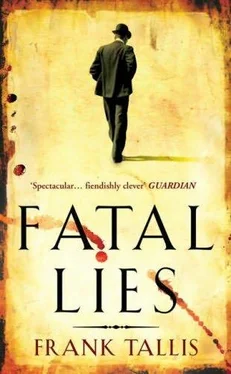Frank Tallis - Fatal Lies
Здесь есть возможность читать онлайн «Frank Tallis - Fatal Lies» весь текст электронной книги совершенно бесплатно (целиком полную версию без сокращений). В некоторых случаях можно слушать аудио, скачать через торрент в формате fb2 и присутствует краткое содержание. Жанр: Исторический детектив, на английском языке. Описание произведения, (предисловие) а так же отзывы посетителей доступны на портале библиотеки ЛибКат.
- Название:Fatal Lies
- Автор:
- Жанр:
- Год:неизвестен
- ISBN:нет данных
- Рейтинг книги:3 / 5. Голосов: 1
-
Избранное:Добавить в избранное
- Отзывы:
-
Ваша оценка:
- 60
- 1
- 2
- 3
- 4
- 5
Fatal Lies: краткое содержание, описание и аннотация
Предлагаем к чтению аннотацию, описание, краткое содержание или предисловие (зависит от того, что написал сам автор книги «Fatal Lies»). Если вы не нашли необходимую информацию о книге — напишите в комментариях, мы постараемся отыскать её.
Fatal Lies — читать онлайн бесплатно полную книгу (весь текст) целиком
Ниже представлен текст книги, разбитый по страницам. Система сохранения места последней прочитанной страницы, позволяет с удобством читать онлайн бесплатно книгу «Fatal Lies», без необходимости каждый раз заново искать на чём Вы остановились. Поставьте закладку, и сможете в любой момент перейти на страницу, на которой закончили чтение.
Интервал:
Закладка:
Rheinhardt had always been a policeman and could imagine no other life. What else could he do? He tried to console himself with the thought that he had acted conscientiously. But, in truth, he knew that he had been impulsive, naive, and somewhat vainglorious. Now he would suffer the consequences.
Brugel's hand moved forward and his raised fingers dropped down on the folder. The inconsequential beat this movement produced sounded-to Rheinhardt-like the boom of a ceremonial drum: an invitation in some ancient rite to ritual slaughter.
“You disobeyed my orders,” said the commissioner, in a low, gravelly voice. “I distinctly recall telling you that as far as I was concerned the Saint Florian's case was closed.”
“Yes, sir,” said Rheinhardt. “You did. However, with the greatest respect…” I have nothing to lose, now, he thought. I might as well defend myself. Rheinhardt took a deep breath. “Sir, I hold the rank of detective inspector. Although it is my duty to obey you — my commanding officer-it is also my duty to serve the Justizpalast, the people of Vienna, and, ultimately, His Majesty the emperor.”
Rheinhardt glanced up at the portrait of Franz Josef-only just visible in the reflected lamplight-and fancied that he saw a glimmer of approval in the old man's expression. “I believe,” he continued, “that I acted correctly and in accordance with the obligations and necessities of my office.”
The commissioner's eyes narrowed and his hand clenched into a tight fist-the knuckles rising up beneath his leathery skin to form a bloodless ridge. On his temple a knotty blood vessel pulsed with febrile malevolence. The commissioner seemed to be on the brink of exploding with rage when-quite suddenly-his expression changed. He sighed, his shoulders fell, and his clenched fist slowly opened.
“My nephew,” said Brugel hoarsely, “has been disgraced.” Rheinhardt did not know how to respond. Their gazes met, and the commissioner continued. “His mother was so proud of him. This will break her heart.” As on the previous occasion when Brugel had mentioned his sister, tender sentiments seemed to diminish him.
“I am very sorry, sir,” said Rheinhardt sincerely.
The commisioner opened his drawer and removed a letter, which he placed carefully on the folder containing Rheinhardt s report.
“From Kiefer,” he said softly. “It does not exonerate him… but it may go some way toward helping us to understand his conduct. You see, the boy claims to have been influenced by certain teachings promulgated by the masters-Eichmann, Gartner, Osterhagen-a philosophy of power. Young minds, Rheinhardt. They are so malleable- so easily corrupted… I have already spoken to the minister of education-who has promised to attend the next meeting of the board of governors.”
The commissioner fell silent again.
“Sir,” said Rheinhardt, “am I to be disciplined?”
The commissioner grunted and shook his head.
“Thank you, sir,” said Rheinhardt. Not wishing to tempt fate, he stood up and clicked his heels. “Should I report to Inspector von Bulow tomorrow morning?”
“No,” said the commissioner. “He doesn't need your assistance anymore.” Brugel succeeded in investing the possessive pronoun with utter contempt.
“Very good, sir,” said Rheinhardt. He bowed-and walked briskly to the door.
70
Liebermann had first met Oppenheim in one of the coffee-houses close to the hospital. Although the young man was studying classics at the university he was a keen amateur psychologist and was always willing to discuss-in his words- the life of the soul. He was an enthusiastic, open-minded fellow, and much more at ease with topics such as sexuality and the conflicts arising between nature and culture than most of Liebermann's colleagues. Their friendship was sustained-as it had begun-by occasional, unplanned encounters in the coffeehouses of the ninth district.
Liebermann had risen early and, on his way to the hospital, was pleasantly surprised to discover Oppenheim sitting outside the Cafe Segel, warming his hands around a steaming, frothy melange and reading a volume of Greek.
They greeted each other cordially, and Oppenheim invited Liebermann to join him for breakfast. Glancing at his wristwatch, Liebermann saw that he had plenty of time to spare and seated himself beside the student.
“What are you reading?” asked Liebermann.
“ A True Story — by Lucian of Samosata,” Oppenheim replied. “An extraordinary piece of writing about a group of adventuring heroes who travel to the moon. It is-at one and the same time-a very early example of fantastic literature and a criticism of ancient authorities that describes mythical events as though they are real.”
This weighty gambit was typical of Oppenheim, whose appetite for intellectual stimulation was not very much affected by the hour of the day. Liebermann-prematurely aged by the youth's indecent vitality-ordered a very strong schwarzer, two kaisersemmel rolls, and some plum conserve.
Their conversation ranged up and down the narrow isthmus that connected classical literature and psychiatry and touched upon Aristotle's De Anima, Hippocrates’ essay on epilepsy and sundry poetical works that took melancholia as their principal theme. After they had been talking for a while, Liebermann began to wonder whether the young scholar might know the answer to a certain question that had been annoying him like the minor but persistent presence of a small stone in a shoe.
“Tell me,” Liebermann asked, “do you have any idea what a Liderc is?”
“A what?”
“A Liderc.”
“Is it a Hungarian word?”
“I believe it is.”
Oppenheim stroked his short beard.
“It sounds vaguely familiar… and I think I may have come across it in a book of folklore. But I can't quite remember. Will you be at the hospital today?”
“Yes.”
“Then I'll look it up and let you know if I find anything.”
The sound of church bells reminded Liebermann that he should be on his way. He rose and deposited a pile of coins on the table: more than enough to cover his own and Oppenheim's breakfast. Before Oppenheim could object-as he usually did-Liebermann declared: “You can pay next time.”
It was of course what Liebermann always said on such occasions. Later in the day Liebermann received a short note from Oppenheim. Dear Friend,
Have just been to the library and managed to run your Liderc to ground in Kobor's Myths and Legends of the Transylvanian Peoples. The Liderc is a kind of satanic lover-ordogszereto in Hungarian-and is similar to an incubus or a succubus. Victims often die of exhaustion on account of the Liderc's stamina and enthusiasm. Well, I should be so lucky! What on earth do you want to know this for? Did one of your patients mention it-and if so, in what context? Until the next timewhen you will allow me to buy you breakfast. Oppenheim
Liebermann placed the note on his desk and stared at it. For once in his life, he desperately wanted to be wrong.
71
An observer unaccustomed to life at Saint Florian's might have described the prevailing mood of the school as subdued. Drexler, however, knew otherwise. He could read the signs like a haruspex: signs that were no less vivid or portentous, as far as he was concerned, than the hot entrails of a freshly slaughtered goat-the whispering, the sidelong glances, the sudden silences, the pursed lips of the masters, the canceled classes. The school was not subdued at all, but seething with nervous excitement.
Drexler was sitting on his own in the dining room, toying with his bruckfleisch — a stew consisting largely of innards, blood, and sweetbreads. A pallid piece of offal surfaced among the slices of heart, liver, and spleen, making him feel slightly nauseous. He was thinking about what had happened that morning. He had been standing in the washroom, waiting his turn to use one of the tin sinks.
Читать дальшеИнтервал:
Закладка:
Похожие книги на «Fatal Lies»
Представляем Вашему вниманию похожие книги на «Fatal Lies» списком для выбора. Мы отобрали схожую по названию и смыслу литературу в надежде предоставить читателям больше вариантов отыскать новые, интересные, ещё непрочитанные произведения.
Обсуждение, отзывы о книге «Fatal Lies» и просто собственные мнения читателей. Оставьте ваши комментарии, напишите, что Вы думаете о произведении, его смысле или главных героях. Укажите что конкретно понравилось, а что нет, и почему Вы так считаете.












